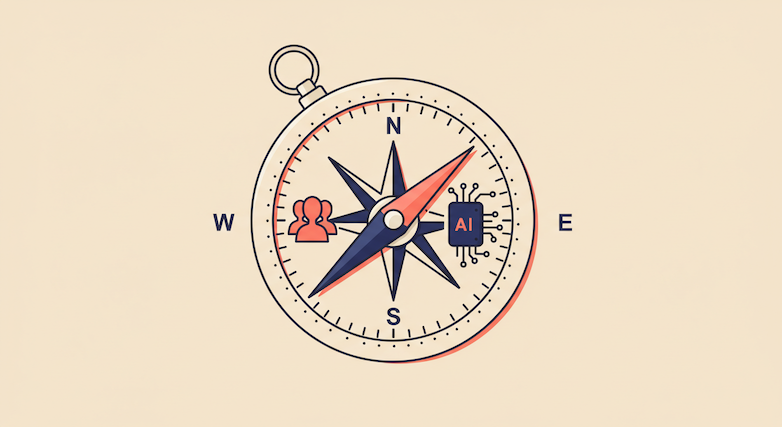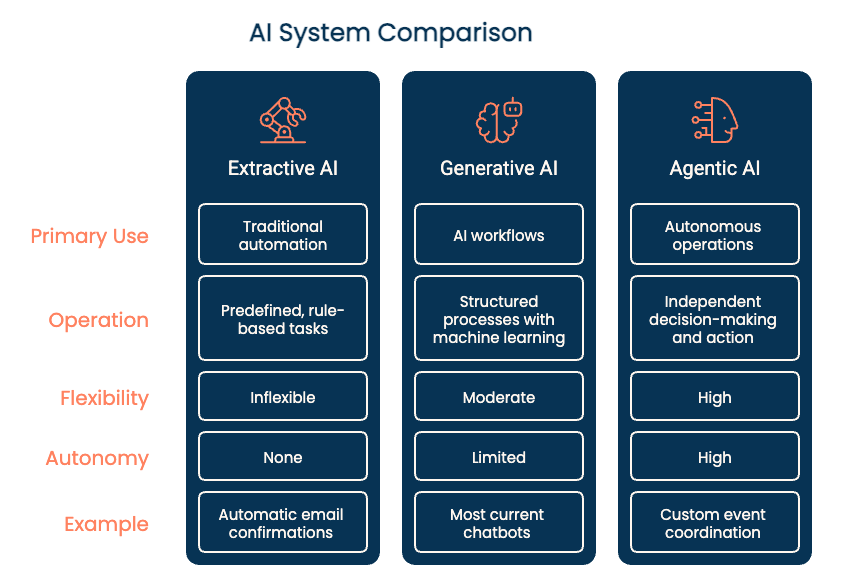Agentic AI can radically change guest relations, but should it?

How autonomous tech is changing guest relations
A family of four approaches your guest services desk at 2pm on a busy Saturday. Their youngest is melting down, they've missed two scheduled shows, and they can't find the restroom—again. Your staff member, already handling three other inquiries, scrambles to address each concern while a line forms behind them.
Now imagine that, instead of waiting in line, the family pulls out their phone and asks an AI assistant that instantly knows their location, preferences, and remaining itinerary. Within seconds, it provides directions to the nearest family restroom, reschedules their missed shows based on current wait times, and suggests a nearby quiet area with activities for overtired children. The entire interaction happens without involving your already-stretched staff.
This isn't science fiction. This is what agentic AI in hospitality looks like, and it's arriving faster than most attraction operators realize.
What is agentic AI?
Agentic AI is a fundamental shift from reactive to proactive digital assistance—moving beyond information retrieval to autonomous decision-making and task execution. Unlike conventional chatbots that offer sophisticated search functions, agentic AI systems have the capability to analyze situations, evaluate options, and execute complex multi-step processes across integrated platforms.
The distinction lies in operational autonomy. Where traditional AI might inform a guest about their restaurant reservation status, agentic AI can assess their entire itinerary, identify scheduling conflicts, automatically negotiate alternative reservation times based on real-time availability data, and execute the rebooking while simultaneously adjusting related services. This technology functions as an integrated operational layer that can interface with your property management systems, reservation platforms, and service databases to orchestrate guest experiences dynamically. The "agentic" designation refers to its capacity for independent reasoning and action—a capability that introduces both operational efficiency and complex oversight considerations.
The pressure to evolve guest services
Traditional guest service models are breaking down under modern pressures. Staff shortages persist across the industry while guest expectations continue rising, shaped by seamless digital experiences in other sectors. Many hospitality operators have responded by implementing basic AI chatbots or automated FAQ systems, but these solutions often frustrate guests more than they help.
The problem isn't that operators have ignored technology—it's that guest service needs are evolving beyond what current AI implementations can handle. Guests don't just want information; they want intelligent assistance that can take action, solve problems, and adapt to their specific situations.
Meanwhile, a new category of AI technology is emerging that promises to address these challenges head-on. AI agents, or Agentic AI, represent a fundamental departure from the chatbots and automated systems most hospitality operators use today. Unlike traditional AI that simply responds to questions, an AI agent can independently navigate multiple systems, make decisions, and take actions on behalf of guests.

Understanding the AI spectrum: from automation to autonomy
To evaluate whether agentic AI belongs in your guest service strategy, it's crucial to understand how it differs from current technologies. The evolution follows a clear progression:
- Extractive AI: Used for traditional automation, extractive AI executes predefined, rule-based tasks. Think of automatic email confirmations or scheduled social media posts. These systems are reliable but inflexible—they can only do exactly what they're programmed to do.
- Generative AI: Used for AI workflows, generative AI incorporates machine learning to handle more complex scenarios while still following structured processes. Most current chatbots fall into this category, using natural language processing to understand questions and provide relevant answers from a database.
- Agentic AI: Unlike extractive or generative, agentic AI operates with a level of autonomy that previous systems couldn't achieve. These systems can independently access multiple databases, manipulate files, make decisions, and take actions across various platforms without requiring human oversight for each step.
"Rather than just one loop using internal knowledge, an AI agent searches the internet in a basic sense, and can query private databases," explains Nutmeg Co-founder and CTO Andrew Spencer. "If it's on your computer, it can manipulate and reference your files. It is more of an actor in the external world."
This autonomy is both agentic AI's greatest strength and its most concerning characteristic. An agentic AI system could potentially book reservations, modify guest itineraries, process refunds, and coordinate with multiple departments—all without human oversight. The efficiency gains could be transformative, but the risks are equally significant.

The promise and the risk
The benefits of agentic agentic AI in hospitality are compelling. These systems never get tired, never call in sick, and can handle unlimited simultaneous conversations. They can access real-time data across all departments, providing guests with accurate information about wait times, availability, and alternatives instantly.
Early adopters in other industries may report dramatic improvements in operational efficiency. However, the hospitality industry's enthusiasm for technological solutions has led to costly mistakes before. The rush to implement mobile apps in the 2010s left many hospitality operators with expensive digital solutions that guests rarely used.
“Hospitality brands have faced a low guest adoption rate for their apps,” Hospitality Technology reported in 2022. “Guests are often reluctant to download another app on their device—an app that will take up storage space and potentially add more clutter—unless they perceive real value.”
The concern with agentic AI isn't just about implementation costs or guest adoption—it's about control and security. When an AI system can "manipulate and reference your files" and access private databases, the potential for data breaches, system errors, and unintended consequences increases exponentially. A malfunctioning agentic AI could potentially modify pricing, cancel reservations, or share sensitive information with unauthorized parties. Not exactly the ideal guest experience.
Is agentic AI data safe?
You may be wondering if this new AI technology for hospitality can be considered safe. In a word or two? Yes and no.
The short answer depends entirely on implementation, oversight, and the specific systems you're dealing with. Let's be honest here: when an AI system can "manipulate and reference your files" and access private databases, you're talking about exponentially increased potential for data breaches, system errors, and unintended consequences. A malfunctioning agentic AI could theoretically modify pricing, cancel reservations, or share sensitive information with unauthorized parties. Not exactly the ideal guest experience.
But here's the nuanced reality—many of these risks exist with human employees too, just in different forms. Humans make mistakes; AI systems can make mistakes at scale and at speeds that are difficult to catch or correct in real-time. When a user engages with an AI system, every piece of information given to that model becomes embedded in its knowledge base. There's no way to ask it to "forget" that information later. For hospitality operators handling thousands of guest interactions daily, this permanent data retention poses significant privacy concerns that need serious consideration
The “black box” problem
Here's where things get genuinely complex: agentic AI systems use multiple interacting agents to make decisions. One agent might function as a "planner" setting a course of action, while others act as "critical thinkers" that assess and adjust these actions in real-time. This creates substantial complexity for hospitality operators already managing multiple operational systems.
When agentic AI makes decisions—like automatically rebooking a guest's itinerary or processing a refund—operators may find themselves unable to explain how or why that decision was made. This creates significant challenges in assigning responsibility for errors or harm and complicates regulatory compliance and legal proceedings.
"Technology doesn't think. It can't be responsible," says IBM's Marina Danilevsky. "There's only so much that a human can do in so much time, whereas the technology can do things in a lot less time and in a way that we might not notice."
Agentic AI's security compromises and over-dependnece risks
Because software agents have access to many different systems with high levels of autonomy, there's increased risk they could expose private data from multiple sources. In hospitality, where we're handling payment information and guest preferences, these vulnerabilities are particularly concerning.
There's also the risk of over-dependence. Over-reliance on agentic AI can lead to erosion of critical human skills caused by blind trust in automated systems. In guest relations—where human intuition and emotional intelligence remain absolutely critical—this dependency could seriously undermine service quality.
Consider the Air France Flight 447 crash in 2009,, where pilots failed to react properly when autopilot disengaged. Airlines subsequently introduced mandatory manual flying hours to prevent skill degradation. A similar concern applies to guest service staff who might lose essential problem-solving abilities if they become too dependent on AI assistance.
A measured approach to AI enhancement
Rather than rushing to implement the latest AI capabilities, successful operators are taking a more measured approach to AI security. They're focusing on understanding their specific guest service challenges and evaluating how different AI technologies might address those needs without introducing unnecessary risks.
The most effective strategy begins with strengthening existing AI implementations before considering more advanced systems. This means ensuring current chatbots provide accurate information, integrating basic AI tools with existing operational systems, and training staff to work effectively alongside AI assistants.
For most operators, the priority should be mastering AI workflows before considering AI agents. AI-powered tools that can intelligently route guest inquiries, provide personalized recommendations based on real-time data, and automate routine tasks offer significant benefits with manageable risks. These systems can dramatically improve guest service efficiency while maintaining human oversight and control.
When evaluating any AI system, security and data governance must be primary considerations. This is especially true for agentic AI, which by design requires extensive access to operational systems and guest data. The autonomy that makes these systems powerful also makes them potentially dangerous if not properly secured and monitored.
The human element remains essential
Perhaps the most important consideration in this discussion is that exceptional guest service ultimately depends on human judgment, empathy, and creativity—qualities that no AI system, regardless of sophistication, can fully replicate. The goal of AI implementation should be to enhance human capabilities, not replace them.
The most successful AI implementations in guest services focus on handling routine inquiries and administrative tasks, freeing human staff to focus on complex problem-solving and relationship building. This approach maximizes the benefits of AI efficiency while preserving the human touch that distinguishes exceptional hospitality experiences.
Related reading: “The AI advantage in hospitality for attractions and hotels”
Moving forward thoughtfully
Agentic AI will undoubtedly transform guest relations in the hospitality industry. The question isn't whether this kind of hospitality technology will become widespread, but whether your organization is prepared to implement it responsibly and effectively.
The smart approach is to build a strong foundation with current AI technologies while carefully monitoring agentic AI developments. Focus on understanding your specific operational challenges, strengthening data security practices, and developing clear policies for AI system oversight and control.
Most importantly, resist the pressure to implement new technologies simply because competitors are doing so or because vendors are promoting them heavily. The history of hospitality technology is littered with expensive solutions that promised revolutionary changes but delivered disappointing results.
Instead, approach agentic AI with healthy skepticism. Ask difficult questions about security, control, and integration. Demand clear evidence of benefits and explanations of risks. The organizations that take the time to understand these technologies thoroughly will be best positioned to implement them successfully when the time is right.
The future of guest relations will certainly include AI, but it doesn't have to include the risks that come with rushing into unproven hospitality technologies. Sometimes the most innovative approach is knowing when not to innovate.
Nutmeg solutions for smooth operations you can trust
At Nutmeg, we understand that implementing AI in guest services requires a thoughtful, measured approach. Our AI guest assistance solutions are designed with built-in safeguards, transparent decision-making processes, and seamless integration capabilities that work within your existing operational framework.
Rather than replacing human judgment, our platform enhances your team's ability to deliver personalized guest experiences while maintaining full visibility into how recommendations and responses are generated.
With real-time monitoring, customizable automation levels, and staff training support, Nutmeg ensures your transition to AI-powered guest services strengthens rather than disrupts your operations.
Ready to explore how AI can enhance your guest experience without the operational headaches? Start up a conversation with our team to learn more about Nutmeg's responsible approach to AI implementation.
Turn one-time visits into lasting connections






